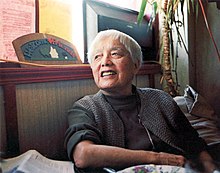Grace Lee Boggs: A Revolutionary Visionary

“You begin with a protest, but you have to move on from there. Just being angry, just being resentful, just being outraged does not constitute revolution.”
Grace Lee Boggs
Throughout history, there were women whose impact transcends their time, leaving an indelible mark on the world. Grace Lee Boggs is one such woman—a philosopher, activist, and revolutionary whose lifelong commitment to social justice continues to inspire and guide generations. For Women’s History Month I wanted to explore the extraordinary life of this remarkable woman and the profound legacy of her advocacy.
Grace Lee Boggs was born to Chinese immigrants
Grace Lee Boggs was born on June 27, 1915, in Providence, Rhode Island, to Chinese immigrant parents. Growing up in a predominantly white neighborhood, she became acutely aware of the injustices faced by marginalized communities and developed a deep sense of empathy and solidarity with the oppressed. Boggs excelled academically, earning a Ph.D. in philosophy from Bryn Mawr College in 1940—a rare achievement for a woman of color in her time.
Throughout her life, Grace Lee Boggs was a tireless advocate for civil rights, labor rights, and social change. In the 1940s and 1950s, she was active in the labor movement, working alongside her husband, James Boggs, to fight for workers’ rights and economic justice. Boggs’s activism extended beyond traditional boundaries, embracing a holistic vision of social transformation that encompassed racial, economic, and environmental justice.
Grace Lee Boggs fought for civil rights
One of Grace Lee Boggs’s most significant contributions to the struggle for justice came during the civil rights movement of the 1960s. She was a key figure in the Detroit grassroots organizing scene, working closely with African American communities to address issues of racial discrimination, poverty, and police brutality. Boggs’s leadership and activism helped to galvanize support for civil rights legislation and paved the way for greater racial equality and empowerment.
Civil rights and grassroot organizing
Grace Lee Boggs’s advocacy on the civil rights movement and grassroots organizing has been profound. Her writings and teachings have inspired generations of activists to embrace a more inclusive and holistic approach to social change, rooted in community empowerment and collective action.
In her later years, Grace Lee Boggs continued to be a leading voice for social justice and environmental sustainability. She advocated for sustainable urban development, community gardening, and grassroots organizing as strategies for building resilient and equitable communities. Boggs’s visionary approach to social change has left an enduring legacy that continues to shape movements for justice and liberation today.
As we celebrate Women’s History Month, let us honor the enduring legacy of Grace Lee Boggs—a woman whose wisdom, courage, and unwavering commitment to justice continue to inspire us all. May her life serve as a reminder of the power of collective action, transformative vision, and the enduring quest for a more just and equitable world for all.
Check back tomorrow for the next woman featured in this series.
Sign up for Kristy's Newsletter!
Get all the updates on upcoming books and events!




